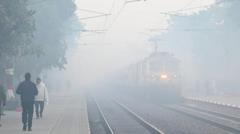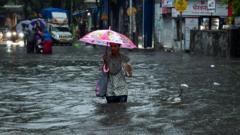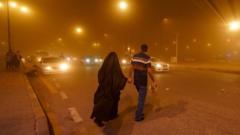**Delhi's ongoing battle with winter air pollution has once again led to widespread travel issues, with hundreds of flights and trains delayed due to dense fog and low visibility.**
**Travel Disruption in Delhi as Smog Paralyzes Operations**

**Travel Disruption in Delhi as Smog Paralyzes Operations**
**Severe fog and hazardous air quality affect flights and trains in the Indian capital.**
Dense fog in Delhi, coupled with alarming air pollution levels, has resulted in significant travel disruptions for hundreds of passengers. On Friday morning, visibility dropped to zero in many regions of the capital, severely impacting flight and train schedules. Reports indicate that more than 150 flights were delayed, along with numerous trains running behind their intended times.
Weather experts noted that the recurring winters in northern India often bring a combination of low temperatures and stagnant air that trap pollutants close to the ground. This weather pattern not only reduces visibility but also poses significant health risks due to hazardous air quality. The air quality index (AQI) across various parts of Delhi reportedly soared above 400, considerably exceeding the World Health Organization's safe threshold by more than 25 times.
In response to the deteriorating conditions, Delhi authorities have reinstated stringent anti-pollution strategies. Measures include halting all construction and demolition work, as well as pivoting school classes to remote formats. A visible blanket of fog has been observed enveloping farms and urban structures, further complicating daily life.
The Delhi International Airport has issued advisories indicating potential disruptions due to the low visibility. Although operations for landings and take-offs continue, flights that lack compliance with CAT III standards—an aviation measure that permits landings in foggy conditions—are facing complications. Flight tracking services noted departures were delayed by upwards of 30 minutes, while arrivals were lagging nearly 20 minutes behind schedule. Frustrated travelers expressed their grievances on social media, illustrating confusion regarding boarding statuses at the airport.
Additionally, the Indian Railways reported that 26 trains arriving in the city were delayed due to the thick fog. However, the local meteorological department has projected light rain over the weekend, which could alleviate some visibility issues. The ongoing situation highlights the persistent struggles Indian cities face in managing seasonal air quality crises, particularly during the cold months of December and January.
Weather experts noted that the recurring winters in northern India often bring a combination of low temperatures and stagnant air that trap pollutants close to the ground. This weather pattern not only reduces visibility but also poses significant health risks due to hazardous air quality. The air quality index (AQI) across various parts of Delhi reportedly soared above 400, considerably exceeding the World Health Organization's safe threshold by more than 25 times.
In response to the deteriorating conditions, Delhi authorities have reinstated stringent anti-pollution strategies. Measures include halting all construction and demolition work, as well as pivoting school classes to remote formats. A visible blanket of fog has been observed enveloping farms and urban structures, further complicating daily life.
The Delhi International Airport has issued advisories indicating potential disruptions due to the low visibility. Although operations for landings and take-offs continue, flights that lack compliance with CAT III standards—an aviation measure that permits landings in foggy conditions—are facing complications. Flight tracking services noted departures were delayed by upwards of 30 minutes, while arrivals were lagging nearly 20 minutes behind schedule. Frustrated travelers expressed their grievances on social media, illustrating confusion regarding boarding statuses at the airport.
Additionally, the Indian Railways reported that 26 trains arriving in the city were delayed due to the thick fog. However, the local meteorological department has projected light rain over the weekend, which could alleviate some visibility issues. The ongoing situation highlights the persistent struggles Indian cities face in managing seasonal air quality crises, particularly during the cold months of December and January.





















